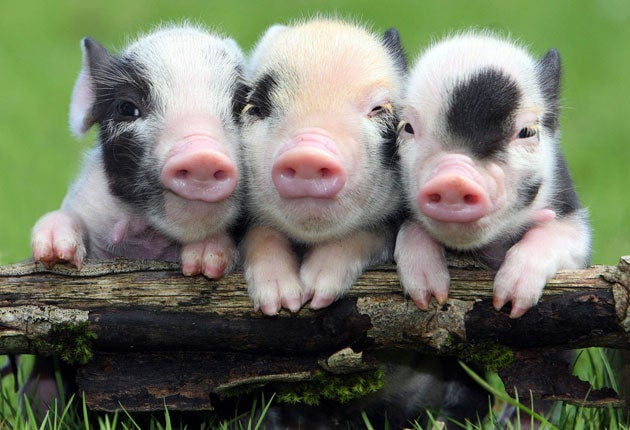Celebrities' favourite pet set to be 'the next lab rat'

Your support helps us to tell the story
From reproductive rights to climate change to Big Tech, The Independent is on the ground when the story is developing. Whether it's investigating the financials of Elon Musk's pro-Trump PAC or producing our latest documentary, 'The A Word', which shines a light on the American women fighting for reproductive rights, we know how important it is to parse out the facts from the messaging.
At such a critical moment in US history, we need reporters on the ground. Your donation allows us to keep sending journalists to speak to both sides of the story.
The Independent is trusted by Americans across the entire political spectrum. And unlike many other quality news outlets, we choose not to lock Americans out of our reporting and analysis with paywalls. We believe quality journalism should be available to everyone, paid for by those who can afford it.
Your support makes all the difference.Mini-pigs, those celebrity pets par excellence, are being lined up as Europe's preferred laboratory animals. The miniature porkers, which can cost more than £1,000 for a piglet, have captured the hearts of various notables, from George Clooney and David Beckham to Paris Hilton and Megan Fox. Now they could be about to replace monkeys, mice, rats and dogs in the testing of new drugs and chemicals.
A five-year study sponsored by the European Union has concluded that miniature pigs are better models for testing the effects of new drugs on humans than other creatures, because of their "close physiological and anatomical similarities to man".
Developed from species such as the Vietnamese pot-bellied pig, mini-pigs first appeared in the West in the 1960s and were initially bred for medical research. But since the 1980s they have become increasingly popular as pets, thanks to their smallness: they weigh about 150lbs, whereas an adult farmyard pig may be six times heavier.
"The pig closely resembles man in many features of its anatomy, physiology, biochemistry and lifestyle," according to the EU report. "In particular, the cardiovascular system, skin and digestive tract are considered to be very good models for man. Because of these similarities, the toxic effects of chemicals and drugs in pigs may resemble the effects on man more closely than [their effects on] some other commonly used laboratory animals."
Animal welfare campaigners are, not surprisingly, unhappy. "Replacing one animal species with another [is not] a step forward with regard to animal testing," said Sarah Kite of the British Union for the Abolition of Vivisection.
Join our commenting forum
Join thought-provoking conversations, follow other Independent readers and see their replies
Comments